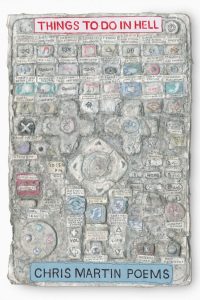Reviewed by Tyler Arnold

The language of poetry is a complicated and varied one, indecipherable to some, perfectly understandable to others. Its meaning depends entirely upon the skill of the poet as well as the inclination of the reader. Moreover, one of the biggest challenges a poet faces is understanding and connecting with a wide variety of people. A massive audience is the poet’s greatest enemy, for good poetry is often—if not always—deeply personal, and exposing oneself to the world is a terrifying prospect. That being said, it’s always a pleasure to stumble across a writer whose work transcends the personal and enters the realm of the universal. Writers of this caliber are often tricky to find, but you need to look no further than Chris Martin.
Martin’s newest poetry collection, Things to Do in Hell, published in the tumultuous year of 2020, provides thoughtful yet biting commentary on American culture. Its contents are comprehensive and quite relevant, particularly to the ongoing COVID-19 pandemic as well as the thousands of protests demanding systemic change in response to racial injustice. As the title suggests, the book provides ample advice on how one should spend one’s time in a fiery afterlife, but it also makes the compelling case that Hell is perhaps much more familiar—much more real—than we secular folk might initially think.
Take, for example, the eponymous poem “Things to Do in Hell,” where Martin compiles a to-do list of possible activities one can partake in during this tough period of time. The list ranges from mundane suggestions (“Grab lunch”, “Try a new flavor of yogurt”, “Smoke some weed”) to more impressive proposals (“Read Kierkegaard”, “Burn in a lake of fire”, “Pull down the statues of people who tortured your ancestors”). The inclusion of Kierkegaard is an especially nice touch, as I’m sure many individuals have been contemplating the struggles of human existence recently. The stark contrast of all these instructions, as well as their close proximity within the poem, beautifully captures the overall theme of Martin’s book, which is that humanity has dragged Hell to the doorstep and set it loose inside the house.
Other lines from the collection ring so true that we’re reminded of how unbalanced some aspects of our society are. The poem “Answers” speaks a powerful message to the heart when it references a shooting that took place at a Planned Parenthood clinic: “And what does it mean that I don’t have to tell you that the man was a man. That I don’t have to say it was a white man shooting people who should not be shot in an office dedicated to women’s health.” Another poem that struck me was “Fifty Shitty Heavens”, for its message—quite bluntly—implies that everyday life isn’t as great as we’d like to think. The lines “Redline heaven” and “Heaven that white people like” are particularly memorable, for they speak volumes on the current social climate of America. Whether he’s commenting on violence that takes place because of flimsy gun control laws or lamenting the fact that white people are never held accountable for their actions, Martin demonstrates that he’s incredibly attuned to the countless problems facing our country today.
However, not all of Martin’s poems are successful in their endeavors. I wasn’t too keen on a few of them, mostly because their aesthetics are too straightforward, and they don’t hit some of the more refined nuances to warrant my remembering them. They don’t stand out; their respective meanings seem to blur together, to the point where their senses of purpose are lost. Additionally, other poems rely too much on repetition, which, stylistically speaking, makes sense for the effect Martin strives to achieve. Still, the repetition seems too clustered and numerous at times, becoming almost claustrophobic.
But for the most part, Things to Do in Hell succeeds in what it aims to accomplish. It is an astonishing book which presents a bold theme: that Hell on Earth will always be possible as long as humans continue ignoring important issues. If any readers are worried about whether or not Martin’s work will resonate with them, then I’d be happy to assuage their apprehensions. Not only does his work echo the cries of the personal, it’s also sure to appeal to the universal. Chris Martin has created a remarkable collection of poetry.
